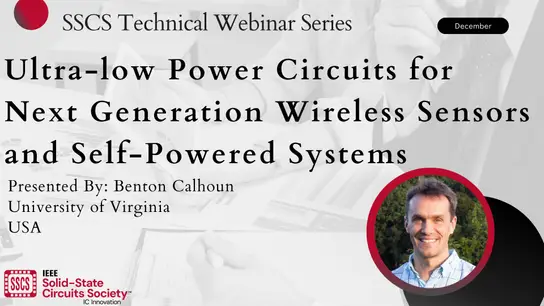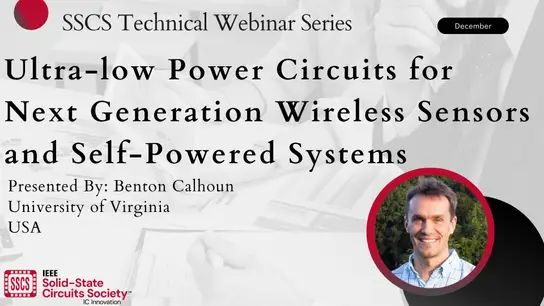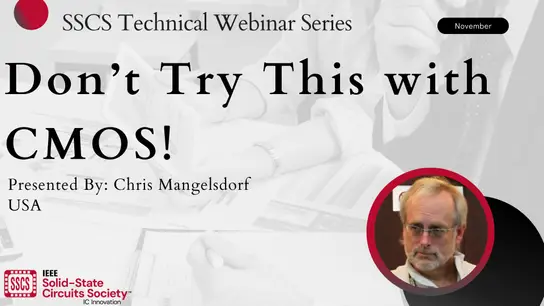Solid-State Circuits Directions Inaugural Workshop: Hardware Security Video
Christopher Fletcher,Ingrid Verbauwhede
-
Members: FreeSSCS
IEEE Members: Free
Non-members: FreeLength: 02:00:00
09 Dec 2020
The Rise of the Insecure Processor: What We Have Learned and Future Opportunities
Presenter: Chris Fletcher, University of Illinois
Abstract: The slowing of Moore's law has created a surge of innovation in the systems/hardware community, enabling once radical ideas such as “rethinking the computing stack” and “accelerators for everything” to enter the mainstream. With these new directions, however, comes potentially much greater system complexity, which in turn provides malicious actors ever more ways to exfiltrate and tamper with sensitive data. My talk will describe this processor security landscape, present and future, in light of these technology trends. The main part of the talk will be to highlight several key, recurring techniques used by defenders and attackers, for both good and evil. I will discuss how these techniques apply in current threat models, hypothesize about how they will be used in the future and describe the cross-discipline opportunities that I see them enabling. The talk will conclude by highlighting several major open challenges.
Bio: Chris Fletcher is an Assistant Professor in Computer Science at the University of Illinois at Urbana-Champaign. He has broad interests ranging from Computer Architecture to Security to High-Performance Computing (ranging from theory to practice). These and related works have been awarded with election to the DARPA ISAT study group, the Intel CRC Outstanding Researcher Award, the NSF CAREER award, a Google Faculty Award, the George M. Sprowls Award for Outstanding Ph.D. Thesis in Computer Science at MIT, 13 paper awards, and were listed as one of ten "World Changing Ideas" designations by Scientific American. Among other projects at UIUC, he leads a center funded by Intel on Processor Security.
Post-Quantum Cryptography
Presenter: Dr. Ir. Ingrid Verbauwhede
Abstract: This presentation is not about quantum computing. Instead it will focus on novel cryptographic algorithms which are resistant to attacks from quantum computers. Indeed, the security of the most popular cryptographic algorithms relies on the computational complexity to break them, which traditionally followed and still follows Moore's law. Yet, with the appearance of quantum computers, scaling key sizes following Moore’s law is no longer valid: quantum algorithms can break existing cryptographic algorithms (so far only theoretically). Therefore, new computationally hard problems are being proposed: the so-called post-quantum secure cryptographic algorithms. Besides resisting attacks from (future) quantum computers, these new algorithms should still run efficiently on existing processors, in hardware or software as dedicated ASIC’s or instruction set extensions. Moreover, they should resist all current attacks, including side-channel and fault attacks. In this presentation we will show potential candidates, as the NIST post-quantum standardization is ongoing. We will also discuss the core hardware building blocks and implementation challenges.
Bio: Dr. Ir. Ingrid Verbauwhede is a Professor in the research group COSIC at the KU Leuven. She is a Member of IACR and a fellow of IEEE. She was elected as a member of the Royal Academy of Belgium in 2011. She is a recipient of an ERC Advanced Grant in 2016 and received the IEEE 2017 Computer Society Technical Achievement Award. She is a pioneer in the field of efficient and secure implementations of cryptographic algorithms on many different platforms: ASIC, FPGA, embedded, cloud. With her research she bridges the gaps between electronics, the mathematics of cryptography and the security of trusted computing, including Physically Unclonable Functions and True Random Number Generators. Her group owns and operates an advanced electronic security evaluation lab.
Presenter: Chris Fletcher, University of Illinois
Abstract: The slowing of Moore's law has created a surge of innovation in the systems/hardware community, enabling once radical ideas such as “rethinking the computing stack” and “accelerators for everything” to enter the mainstream. With these new directions, however, comes potentially much greater system complexity, which in turn provides malicious actors ever more ways to exfiltrate and tamper with sensitive data. My talk will describe this processor security landscape, present and future, in light of these technology trends. The main part of the talk will be to highlight several key, recurring techniques used by defenders and attackers, for both good and evil. I will discuss how these techniques apply in current threat models, hypothesize about how they will be used in the future and describe the cross-discipline opportunities that I see them enabling. The talk will conclude by highlighting several major open challenges.
Bio: Chris Fletcher is an Assistant Professor in Computer Science at the University of Illinois at Urbana-Champaign. He has broad interests ranging from Computer Architecture to Security to High-Performance Computing (ranging from theory to practice). These and related works have been awarded with election to the DARPA ISAT study group, the Intel CRC Outstanding Researcher Award, the NSF CAREER award, a Google Faculty Award, the George M. Sprowls Award for Outstanding Ph.D. Thesis in Computer Science at MIT, 13 paper awards, and were listed as one of ten "World Changing Ideas" designations by Scientific American. Among other projects at UIUC, he leads a center funded by Intel on Processor Security.
Post-Quantum Cryptography
Presenter: Dr. Ir. Ingrid Verbauwhede
Abstract: This presentation is not about quantum computing. Instead it will focus on novel cryptographic algorithms which are resistant to attacks from quantum computers. Indeed, the security of the most popular cryptographic algorithms relies on the computational complexity to break them, which traditionally followed and still follows Moore's law. Yet, with the appearance of quantum computers, scaling key sizes following Moore’s law is no longer valid: quantum algorithms can break existing cryptographic algorithms (so far only theoretically). Therefore, new computationally hard problems are being proposed: the so-called post-quantum secure cryptographic algorithms. Besides resisting attacks from (future) quantum computers, these new algorithms should still run efficiently on existing processors, in hardware or software as dedicated ASIC’s or instruction set extensions. Moreover, they should resist all current attacks, including side-channel and fault attacks. In this presentation we will show potential candidates, as the NIST post-quantum standardization is ongoing. We will also discuss the core hardware building blocks and implementation challenges.
Bio: Dr. Ir. Ingrid Verbauwhede is a Professor in the research group COSIC at the KU Leuven. She is a Member of IACR and a fellow of IEEE. She was elected as a member of the Royal Academy of Belgium in 2011. She is a recipient of an ERC Advanced Grant in 2016 and received the IEEE 2017 Computer Society Technical Achievement Award. She is a pioneer in the field of efficient and secure implementations of cryptographic algorithms on many different platforms: ASIC, FPGA, embedded, cloud. With her research she bridges the gaps between electronics, the mathematics of cryptography and the security of trusted computing, including Physically Unclonable Functions and True Random Number Generators. Her group owns and operates an advanced electronic security evaluation lab.


